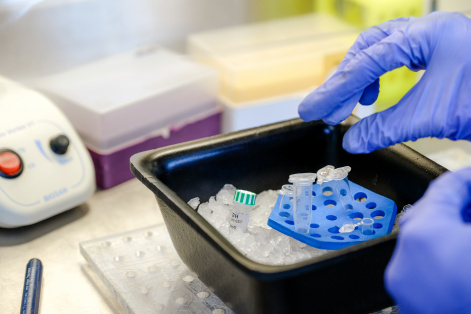Krasnoyarsk scientists: genetic analysis will help to avoid severe development of bronchial asthma
26 April 2021 г.

Bronchial asthma is a common chronic inflammatory airway disease. The disease affects people of all ages and has serious consequences, and in some cases it is fatal. According to the observations of physicians, the number of patients with severe bronchial asthma has increased since the beginning of the 21st century. Early prediction of severe development of the disease is important for the timely provision of care to the patient, choice of the therapy, and prevention of complications.
To prevent complications of bronchial asthma, prognostic markers are needed which would indicate the chances of developing its severe course. A team of medical scientists from the Federal Research Center "Krasnoyarsk Science Center SB RAS" is looking for a solution to this problem. The researchers discovered immunogenetic factors which can be signs of the possible development of severe bronchial asthma.
Bronchial asthma is a multifactorial disease. This means that numerous factors affect its occurrence, exacerbation or its severe uncontrolled course. One of the main ones is genetic determinism, pathological mutations in genes which are often congenital. However, one genetic "breakdown" is not enough for the appearance of the disease. There should be an "extra push", for example, allergens, stress, living conditions or exposure to unfavorable environmental factors.
Krasnoyarsk scientists set themselves the task of finding immunogenetic markers indicating the predisposition to the bronchial asthma and its severe development. To do this, scientists considered not only genes, but also proteins involved in the development of the disease. During their study, the researchers found patterns in the frequency of some gene variants, as well as in changes in the concentration of the corresponding metabolites in severe bronchial asthma. For example, the level of cytokine proteins was significantly lower in patients with severe asthma and depended on its severity.
“Asthma is a serious socially significant disease that leads to physical and psychological discomfort. If the therapy is poorly selected or it does not allow one to control the disease, and thus, in some patients it can turn into severe forms and result in disability and even death. On the other hand, someone can live with this disease without having great complications. Genetic factors predispose to this. Our task is to identify markers in order to predict the probability of developing a severe form at an early stage of the disease. So far, we have identified genetic markers for susceptibility to severe asthma in children. They have turned out to be allelic variants of the G-IL12B and T-IL13 genes. In the future, we plan to introduce guidelines for the investigation of gene polymorphism and the level of their encoded proteins into practical healthcare. The aim of our work is to prevent the development of bronchial asthma in a severe uncontrolled form, ”said Marina Smolnikova, Candidate of Biological Sciences, head of the molecular genetic research group at the Scientific Research Institute of Medical Problems of the North of SB RAS.
As Marina Smolnikova notes, the predisposition to severe forms of bronchial asthma is determined by genetic and environmental factors. And if a person knows in advance his tendency to a severe course of the disease, this will allow one to adjust therapy and change the conditions of life and professional activity as well as other factors which contribute to the development of the disease, so as not to harm his health and avoid the development of a severe form of the disease.
Share:
